BMP6003 International HRM: Overcoming Cultural Challenges in Japan
VerifiedAdded on 2023/06/14
|10
|3191
|331
Report
AI Summary
This report examines the cultural challenges faced by UK companies when expanding their international HRM operations into Japan. It identifies key issues such as the need for detailed information, pre-determination of work processes, differences in work-life balance, autocratic leadership styles, and variations in working hours and formal behavior. The report contrasts these aspects with UK business culture, highlighting potential advantages and disadvantages of cross-cultural approaches. It also addresses the role of IHRM in adapting to local cultures and motivating employees, alongside broader issues faced by UK companies expanding globally, including compensation expectations, working condition demands, and the need for comprehensive training and development programs. Desklib offers a range of resources including past papers and solved assignments for students.
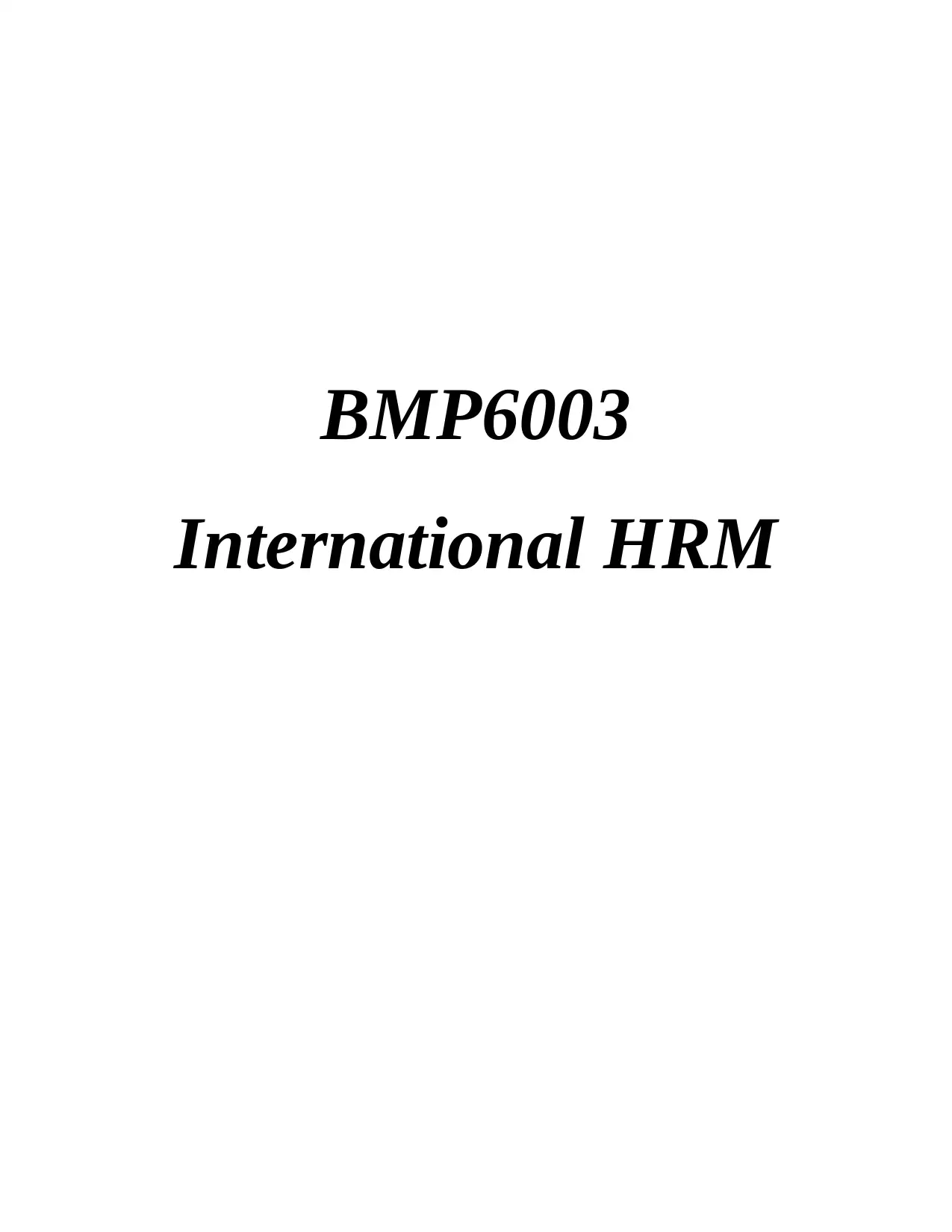
BMP6003
International HRM
International HRM
Paraphrase This Document
Need a fresh take? Get an instant paraphrase of this document with our AI Paraphraser
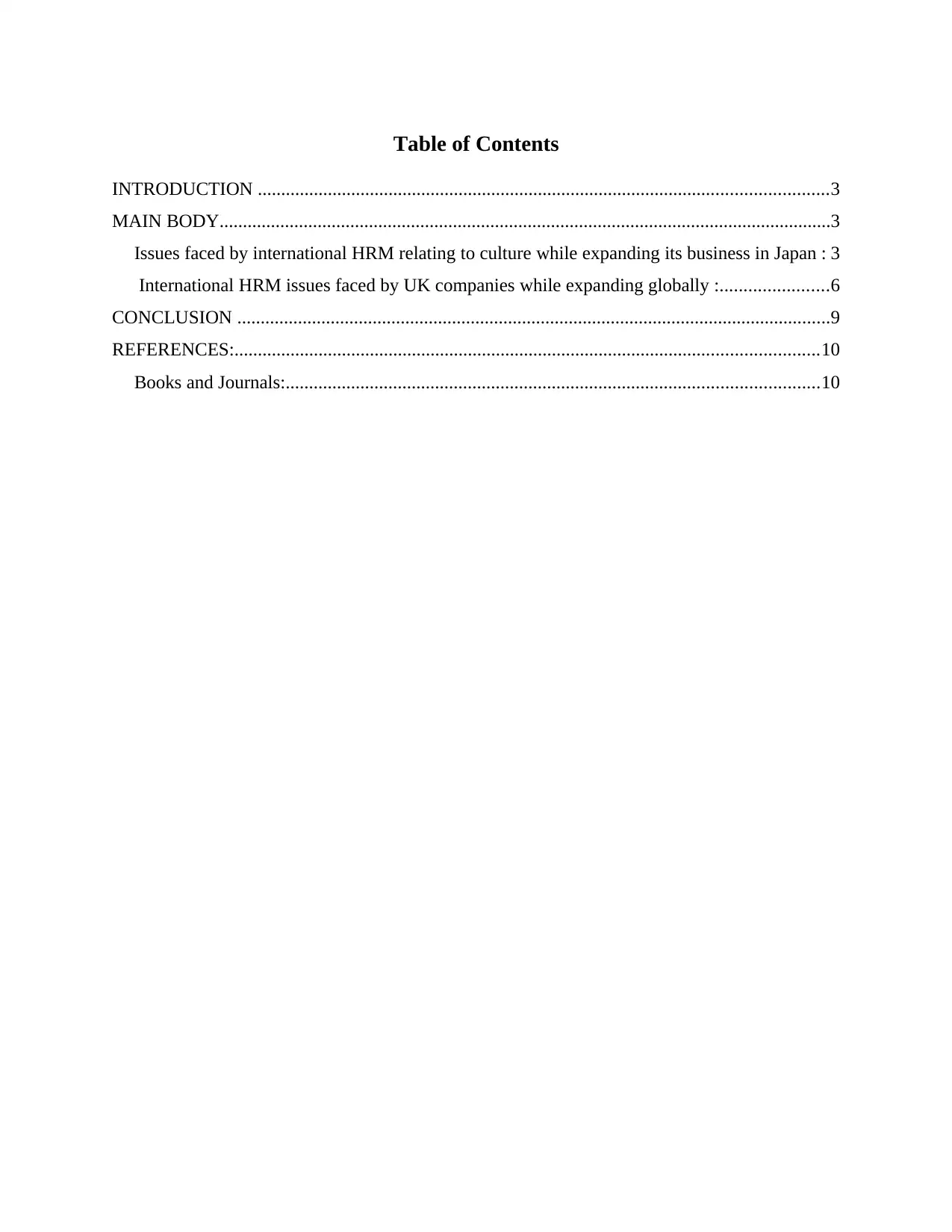
Table of Contents
INTRODUCTION ..........................................................................................................................3
MAIN BODY...................................................................................................................................3
Issues faced by international HRM relating to culture while expanding its business in Japan : 3
International HRM issues faced by UK companies while expanding globally :.......................6
CONCLUSION ...............................................................................................................................9
REFERENCES:.............................................................................................................................10
Books and Journals:..................................................................................................................10
INTRODUCTION ..........................................................................................................................3
MAIN BODY...................................................................................................................................3
Issues faced by international HRM relating to culture while expanding its business in Japan : 3
International HRM issues faced by UK companies while expanding globally :.......................6
CONCLUSION ...............................................................................................................................9
REFERENCES:.............................................................................................................................10
Books and Journals:..................................................................................................................10
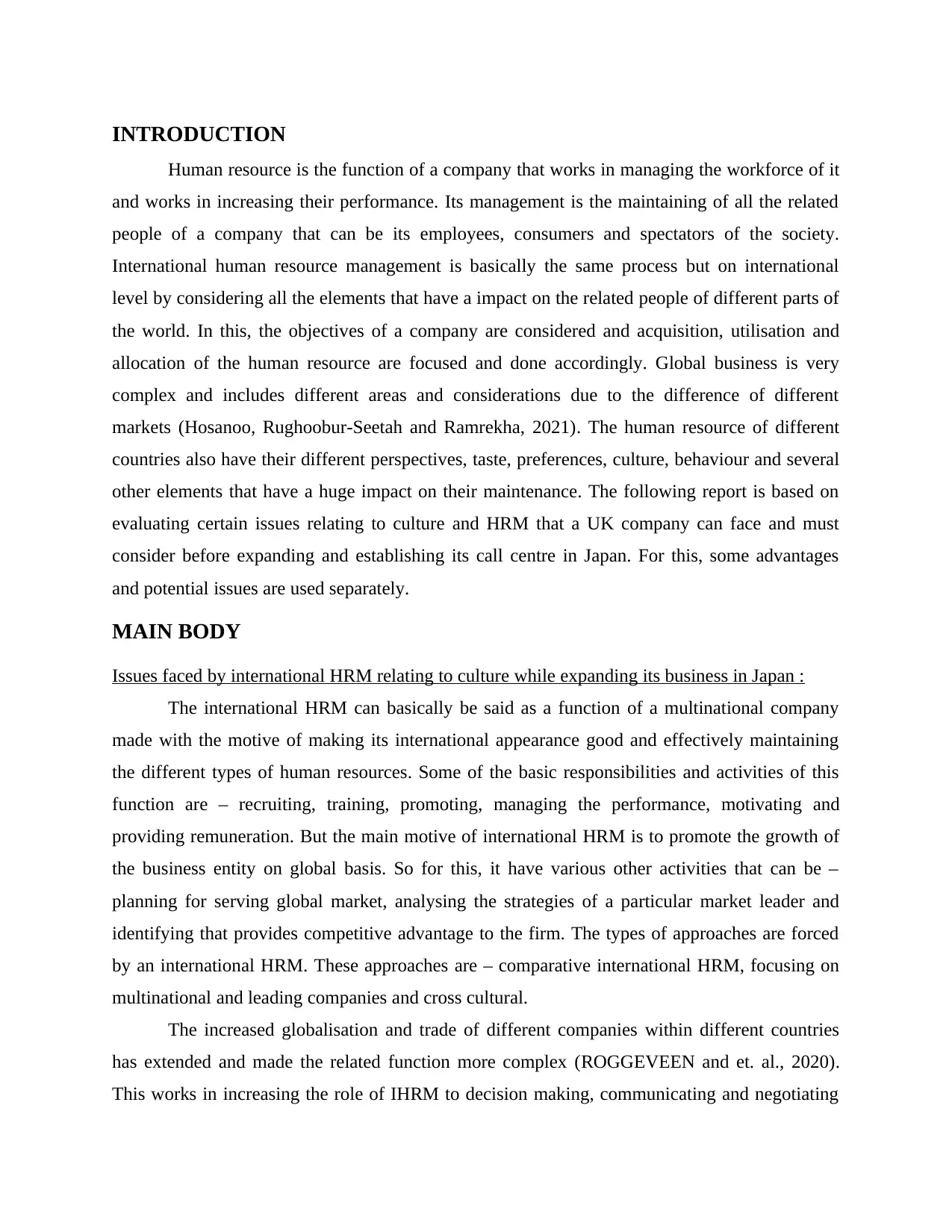
INTRODUCTION
Human resource is the function of a company that works in managing the workforce of it
and works in increasing their performance. Its management is the maintaining of all the related
people of a company that can be its employees, consumers and spectators of the society.
International human resource management is basically the same process but on international
level by considering all the elements that have a impact on the related people of different parts of
the world. In this, the objectives of a company are considered and acquisition, utilisation and
allocation of the human resource are focused and done accordingly. Global business is very
complex and includes different areas and considerations due to the difference of different
markets (Hosanoo, Rughoobur-Seetah and Ramrekha, 2021). The human resource of different
countries also have their different perspectives, taste, preferences, culture, behaviour and several
other elements that have a huge impact on their maintenance. The following report is based on
evaluating certain issues relating to culture and HRM that a UK company can face and must
consider before expanding and establishing its call centre in Japan. For this, some advantages
and potential issues are used separately.
MAIN BODY
Issues faced by international HRM relating to culture while expanding its business in Japan :
The international HRM can basically be said as a function of a multinational company
made with the motive of making its international appearance good and effectively maintaining
the different types of human resources. Some of the basic responsibilities and activities of this
function are – recruiting, training, promoting, managing the performance, motivating and
providing remuneration. But the main motive of international HRM is to promote the growth of
the business entity on global basis. So for this, it have various other activities that can be –
planning for serving global market, analysing the strategies of a particular market leader and
identifying that provides competitive advantage to the firm. The types of approaches are forced
by an international HRM. These approaches are – comparative international HRM, focusing on
multinational and leading companies and cross cultural.
The increased globalisation and trade of different companies within different countries
has extended and made the related function more complex (ROGGEVEEN and et. al., 2020).
This works in increasing the role of IHRM to decision making, communicating and negotiating
Human resource is the function of a company that works in managing the workforce of it
and works in increasing their performance. Its management is the maintaining of all the related
people of a company that can be its employees, consumers and spectators of the society.
International human resource management is basically the same process but on international
level by considering all the elements that have a impact on the related people of different parts of
the world. In this, the objectives of a company are considered and acquisition, utilisation and
allocation of the human resource are focused and done accordingly. Global business is very
complex and includes different areas and considerations due to the difference of different
markets (Hosanoo, Rughoobur-Seetah and Ramrekha, 2021). The human resource of different
countries also have their different perspectives, taste, preferences, culture, behaviour and several
other elements that have a huge impact on their maintenance. The following report is based on
evaluating certain issues relating to culture and HRM that a UK company can face and must
consider before expanding and establishing its call centre in Japan. For this, some advantages
and potential issues are used separately.
MAIN BODY
Issues faced by international HRM relating to culture while expanding its business in Japan :
The international HRM can basically be said as a function of a multinational company
made with the motive of making its international appearance good and effectively maintaining
the different types of human resources. Some of the basic responsibilities and activities of this
function are – recruiting, training, promoting, managing the performance, motivating and
providing remuneration. But the main motive of international HRM is to promote the growth of
the business entity on global basis. So for this, it have various other activities that can be –
planning for serving global market, analysing the strategies of a particular market leader and
identifying that provides competitive advantage to the firm. The types of approaches are forced
by an international HRM. These approaches are – comparative international HRM, focusing on
multinational and leading companies and cross cultural.
The increased globalisation and trade of different companies within different countries
has extended and made the related function more complex (ROGGEVEEN and et. al., 2020).
This works in increasing the role of IHRM to decision making, communicating and negotiating
⊘ This is a preview!⊘
Do you want full access?
Subscribe today to unlock all pages.

Trusted by 1+ million students worldwide
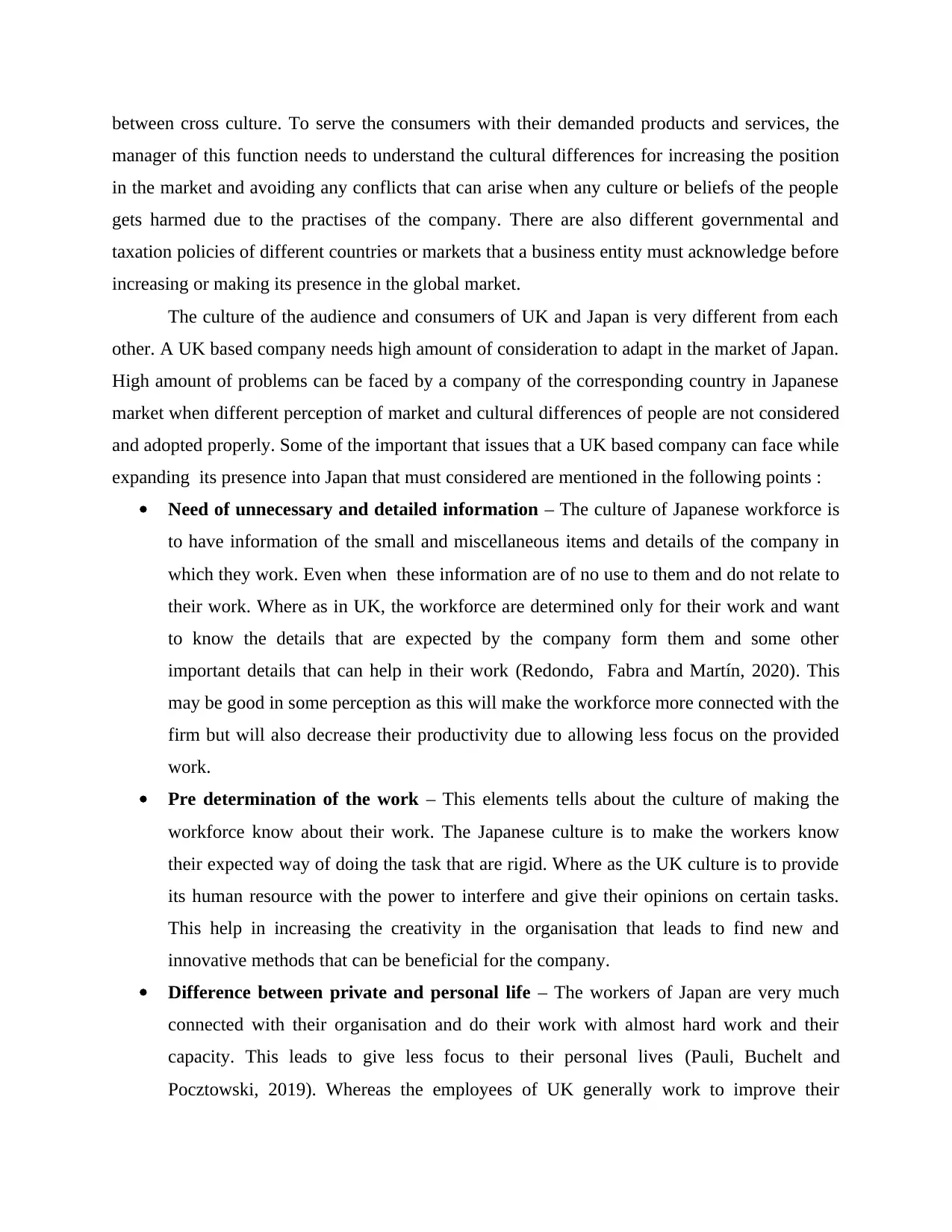
between cross culture. To serve the consumers with their demanded products and services, the
manager of this function needs to understand the cultural differences for increasing the position
in the market and avoiding any conflicts that can arise when any culture or beliefs of the people
gets harmed due to the practises of the company. There are also different governmental and
taxation policies of different countries or markets that a business entity must acknowledge before
increasing or making its presence in the global market.
The culture of the audience and consumers of UK and Japan is very different from each
other. A UK based company needs high amount of consideration to adapt in the market of Japan.
High amount of problems can be faced by a company of the corresponding country in Japanese
market when different perception of market and cultural differences of people are not considered
and adopted properly. Some of the important that issues that a UK based company can face while
expanding its presence into Japan that must considered are mentioned in the following points :
Need of unnecessary and detailed information – The culture of Japanese workforce is
to have information of the small and miscellaneous items and details of the company in
which they work. Even when these information are of no use to them and do not relate to
their work. Where as in UK, the workforce are determined only for their work and want
to know the details that are expected by the company form them and some other
important details that can help in their work (Redondo, Fabra and Martín, 2020). This
may be good in some perception as this will make the workforce more connected with the
firm but will also decrease their productivity due to allowing less focus on the provided
work.
Pre determination of the work – This elements tells about the culture of making the
workforce know about their work. The Japanese culture is to make the workers know
their expected way of doing the task that are rigid. Where as the UK culture is to provide
its human resource with the power to interfere and give their opinions on certain tasks.
This help in increasing the creativity in the organisation that leads to find new and
innovative methods that can be beneficial for the company.
Difference between private and personal life – The workers of Japan are very much
connected with their organisation and do their work with almost hard work and their
capacity. This leads to give less focus to their personal lives (Pauli, Buchelt and
Pocztowski, 2019). Whereas the employees of UK generally work to improve their
manager of this function needs to understand the cultural differences for increasing the position
in the market and avoiding any conflicts that can arise when any culture or beliefs of the people
gets harmed due to the practises of the company. There are also different governmental and
taxation policies of different countries or markets that a business entity must acknowledge before
increasing or making its presence in the global market.
The culture of the audience and consumers of UK and Japan is very different from each
other. A UK based company needs high amount of consideration to adapt in the market of Japan.
High amount of problems can be faced by a company of the corresponding country in Japanese
market when different perception of market and cultural differences of people are not considered
and adopted properly. Some of the important that issues that a UK based company can face while
expanding its presence into Japan that must considered are mentioned in the following points :
Need of unnecessary and detailed information – The culture of Japanese workforce is
to have information of the small and miscellaneous items and details of the company in
which they work. Even when these information are of no use to them and do not relate to
their work. Where as in UK, the workforce are determined only for their work and want
to know the details that are expected by the company form them and some other
important details that can help in their work (Redondo, Fabra and Martín, 2020). This
may be good in some perception as this will make the workforce more connected with the
firm but will also decrease their productivity due to allowing less focus on the provided
work.
Pre determination of the work – This elements tells about the culture of making the
workforce know about their work. The Japanese culture is to make the workers know
their expected way of doing the task that are rigid. Where as the UK culture is to provide
its human resource with the power to interfere and give their opinions on certain tasks.
This help in increasing the creativity in the organisation that leads to find new and
innovative methods that can be beneficial for the company.
Difference between private and personal life – The workers of Japan are very much
connected with their organisation and do their work with almost hard work and their
capacity. This leads to give less focus to their personal lives (Pauli, Buchelt and
Pocztowski, 2019). Whereas the employees of UK generally work to improve their
Paraphrase This Document
Need a fresh take? Get an instant paraphrase of this document with our AI Paraphraser
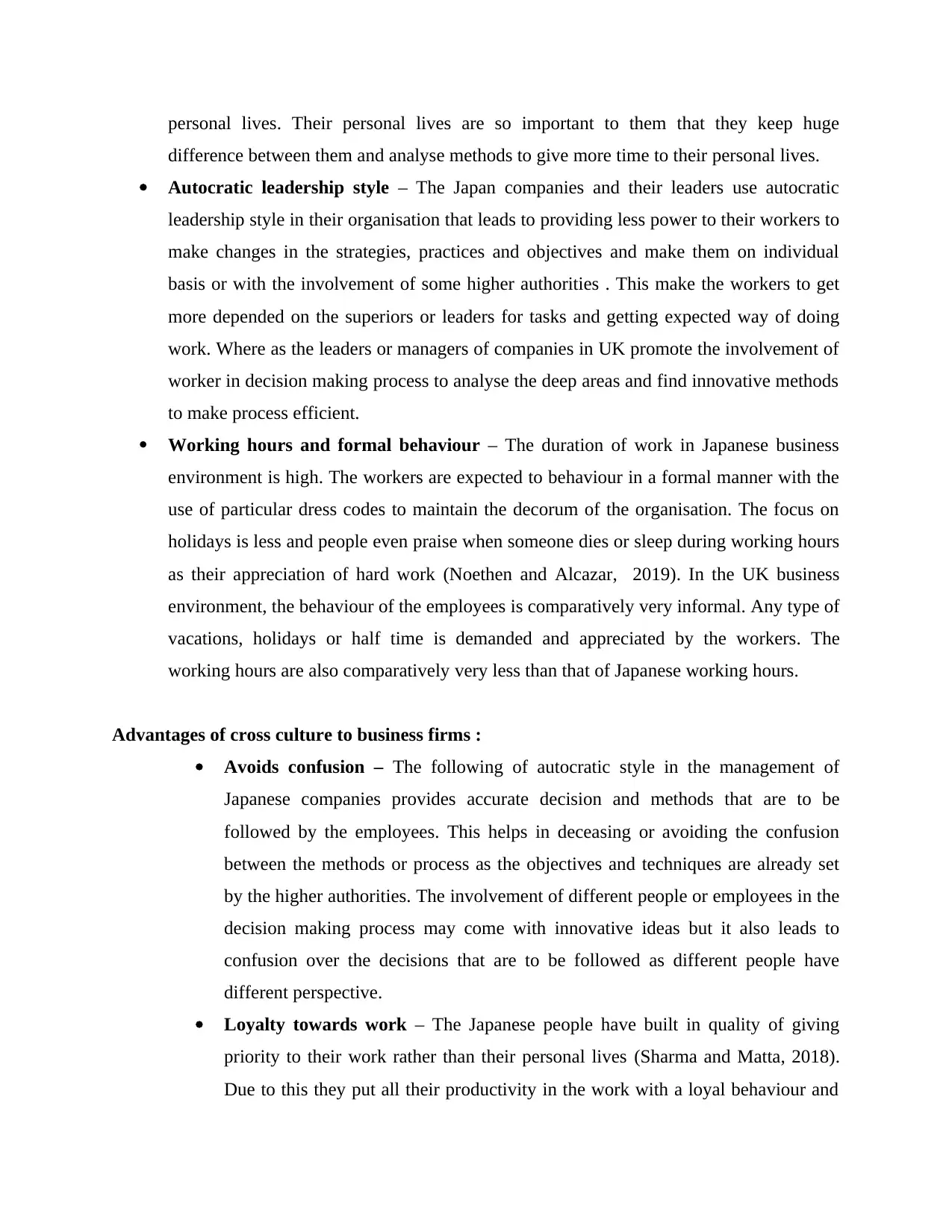
personal lives. Their personal lives are so important to them that they keep huge
difference between them and analyse methods to give more time to their personal lives.
Autocratic leadership style – The Japan companies and their leaders use autocratic
leadership style in their organisation that leads to providing less power to their workers to
make changes in the strategies, practices and objectives and make them on individual
basis or with the involvement of some higher authorities . This make the workers to get
more depended on the superiors or leaders for tasks and getting expected way of doing
work. Where as the leaders or managers of companies in UK promote the involvement of
worker in decision making process to analyse the deep areas and find innovative methods
to make process efficient.
Working hours and formal behaviour – The duration of work in Japanese business
environment is high. The workers are expected to behaviour in a formal manner with the
use of particular dress codes to maintain the decorum of the organisation. The focus on
holidays is less and people even praise when someone dies or sleep during working hours
as their appreciation of hard work (Noethen and Alcazar, 2019). In the UK business
environment, the behaviour of the employees is comparatively very informal. Any type of
vacations, holidays or half time is demanded and appreciated by the workers. The
working hours are also comparatively very less than that of Japanese working hours.
Advantages of cross culture to business firms :
Avoids confusion – The following of autocratic style in the management of
Japanese companies provides accurate decision and methods that are to be
followed by the employees. This helps in deceasing or avoiding the confusion
between the methods or process as the objectives and techniques are already set
by the higher authorities. The involvement of different people or employees in the
decision making process may come with innovative ideas but it also leads to
confusion over the decisions that are to be followed as different people have
different perspective.
Loyalty towards work – The Japanese people have built in quality of giving
priority to their work rather than their personal lives (Sharma and Matta, 2018).
Due to this they put all their productivity in the work with a loyal behaviour and
difference between them and analyse methods to give more time to their personal lives.
Autocratic leadership style – The Japan companies and their leaders use autocratic
leadership style in their organisation that leads to providing less power to their workers to
make changes in the strategies, practices and objectives and make them on individual
basis or with the involvement of some higher authorities . This make the workers to get
more depended on the superiors or leaders for tasks and getting expected way of doing
work. Where as the leaders or managers of companies in UK promote the involvement of
worker in decision making process to analyse the deep areas and find innovative methods
to make process efficient.
Working hours and formal behaviour – The duration of work in Japanese business
environment is high. The workers are expected to behaviour in a formal manner with the
use of particular dress codes to maintain the decorum of the organisation. The focus on
holidays is less and people even praise when someone dies or sleep during working hours
as their appreciation of hard work (Noethen and Alcazar, 2019). In the UK business
environment, the behaviour of the employees is comparatively very informal. Any type of
vacations, holidays or half time is demanded and appreciated by the workers. The
working hours are also comparatively very less than that of Japanese working hours.
Advantages of cross culture to business firms :
Avoids confusion – The following of autocratic style in the management of
Japanese companies provides accurate decision and methods that are to be
followed by the employees. This helps in deceasing or avoiding the confusion
between the methods or process as the objectives and techniques are already set
by the higher authorities. The involvement of different people or employees in the
decision making process may come with innovative ideas but it also leads to
confusion over the decisions that are to be followed as different people have
different perspective.
Loyalty towards work – The Japanese people have built in quality of giving
priority to their work rather than their personal lives (Sharma and Matta, 2018).
Due to this they put all their productivity in the work with a loyal behaviour and
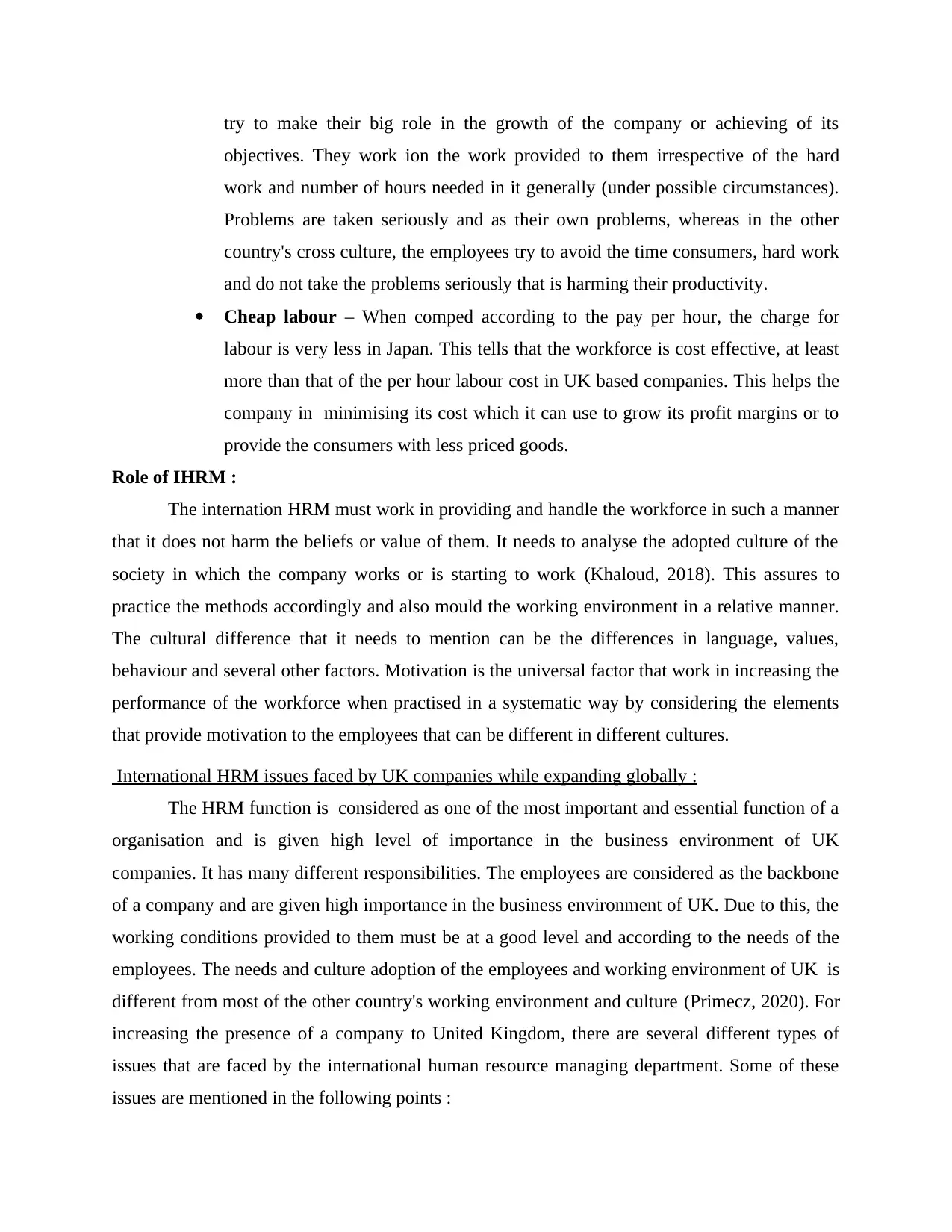
try to make their big role in the growth of the company or achieving of its
objectives. They work ion the work provided to them irrespective of the hard
work and number of hours needed in it generally (under possible circumstances).
Problems are taken seriously and as their own problems, whereas in the other
country's cross culture, the employees try to avoid the time consumers, hard work
and do not take the problems seriously that is harming their productivity.
Cheap labour – When comped according to the pay per hour, the charge for
labour is very less in Japan. This tells that the workforce is cost effective, at least
more than that of the per hour labour cost in UK based companies. This helps the
company in minimising its cost which it can use to grow its profit margins or to
provide the consumers with less priced goods.
Role of IHRM :
The internation HRM must work in providing and handle the workforce in such a manner
that it does not harm the beliefs or value of them. It needs to analyse the adopted culture of the
society in which the company works or is starting to work (Khaloud, 2018). This assures to
practice the methods accordingly and also mould the working environment in a relative manner.
The cultural difference that it needs to mention can be the differences in language, values,
behaviour and several other factors. Motivation is the universal factor that work in increasing the
performance of the workforce when practised in a systematic way by considering the elements
that provide motivation to the employees that can be different in different cultures.
International HRM issues faced by UK companies while expanding globally :
The HRM function is considered as one of the most important and essential function of a
organisation and is given high level of importance in the business environment of UK
companies. It has many different responsibilities. The employees are considered as the backbone
of a company and are given high importance in the business environment of UK. Due to this, the
working conditions provided to them must be at a good level and according to the needs of the
employees. The needs and culture adoption of the employees and working environment of UK is
different from most of the other country's working environment and culture (Primecz, 2020). For
increasing the presence of a company to United Kingdom, there are several different types of
issues that are faced by the international human resource managing department. Some of these
issues are mentioned in the following points :
objectives. They work ion the work provided to them irrespective of the hard
work and number of hours needed in it generally (under possible circumstances).
Problems are taken seriously and as their own problems, whereas in the other
country's cross culture, the employees try to avoid the time consumers, hard work
and do not take the problems seriously that is harming their productivity.
Cheap labour – When comped according to the pay per hour, the charge for
labour is very less in Japan. This tells that the workforce is cost effective, at least
more than that of the per hour labour cost in UK based companies. This helps the
company in minimising its cost which it can use to grow its profit margins or to
provide the consumers with less priced goods.
Role of IHRM :
The internation HRM must work in providing and handle the workforce in such a manner
that it does not harm the beliefs or value of them. It needs to analyse the adopted culture of the
society in which the company works or is starting to work (Khaloud, 2018). This assures to
practice the methods accordingly and also mould the working environment in a relative manner.
The cultural difference that it needs to mention can be the differences in language, values,
behaviour and several other factors. Motivation is the universal factor that work in increasing the
performance of the workforce when practised in a systematic way by considering the elements
that provide motivation to the employees that can be different in different cultures.
International HRM issues faced by UK companies while expanding globally :
The HRM function is considered as one of the most important and essential function of a
organisation and is given high level of importance in the business environment of UK
companies. It has many different responsibilities. The employees are considered as the backbone
of a company and are given high importance in the business environment of UK. Due to this, the
working conditions provided to them must be at a good level and according to the needs of the
employees. The needs and culture adoption of the employees and working environment of UK is
different from most of the other country's working environment and culture (Primecz, 2020). For
increasing the presence of a company to United Kingdom, there are several different types of
issues that are faced by the international human resource managing department. Some of these
issues are mentioned in the following points :
⊘ This is a preview!⊘
Do you want full access?
Subscribe today to unlock all pages.

Trusted by 1+ million students worldwide
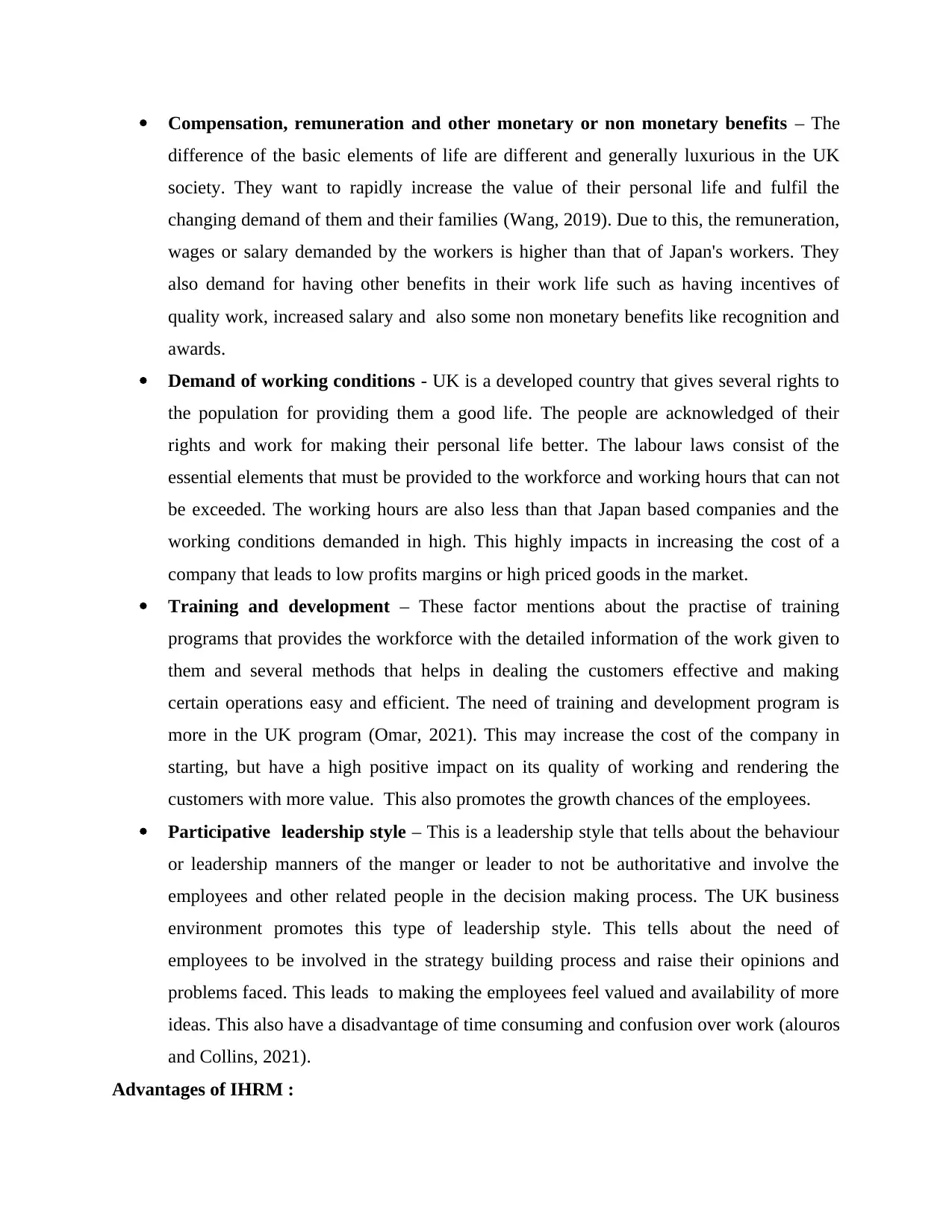
Compensation, remuneration and other monetary or non monetary benefits – The
difference of the basic elements of life are different and generally luxurious in the UK
society. They want to rapidly increase the value of their personal life and fulfil the
changing demand of them and their families (Wang, 2019). Due to this, the remuneration,
wages or salary demanded by the workers is higher than that of Japan's workers. They
also demand for having other benefits in their work life such as having incentives of
quality work, increased salary and also some non monetary benefits like recognition and
awards.
Demand of working conditions - UK is a developed country that gives several rights to
the population for providing them a good life. The people are acknowledged of their
rights and work for making their personal life better. The labour laws consist of the
essential elements that must be provided to the workforce and working hours that can not
be exceeded. The working hours are also less than that Japan based companies and the
working conditions demanded in high. This highly impacts in increasing the cost of a
company that leads to low profits margins or high priced goods in the market.
Training and development – These factor mentions about the practise of training
programs that provides the workforce with the detailed information of the work given to
them and several methods that helps in dealing the customers effective and making
certain operations easy and efficient. The need of training and development program is
more in the UK program (Omar, 2021). This may increase the cost of the company in
starting, but have a high positive impact on its quality of working and rendering the
customers with more value. This also promotes the growth chances of the employees.
Participative leadership style – This is a leadership style that tells about the behaviour
or leadership manners of the manger or leader to not be authoritative and involve the
employees and other related people in the decision making process. The UK business
environment promotes this type of leadership style. This tells about the need of
employees to be involved in the strategy building process and raise their opinions and
problems faced. This leads to making the employees feel valued and availability of more
ideas. This also have a disadvantage of time consuming and confusion over work (alouros
and Collins, 2021).
Advantages of IHRM :
difference of the basic elements of life are different and generally luxurious in the UK
society. They want to rapidly increase the value of their personal life and fulfil the
changing demand of them and their families (Wang, 2019). Due to this, the remuneration,
wages or salary demanded by the workers is higher than that of Japan's workers. They
also demand for having other benefits in their work life such as having incentives of
quality work, increased salary and also some non monetary benefits like recognition and
awards.
Demand of working conditions - UK is a developed country that gives several rights to
the population for providing them a good life. The people are acknowledged of their
rights and work for making their personal life better. The labour laws consist of the
essential elements that must be provided to the workforce and working hours that can not
be exceeded. The working hours are also less than that Japan based companies and the
working conditions demanded in high. This highly impacts in increasing the cost of a
company that leads to low profits margins or high priced goods in the market.
Training and development – These factor mentions about the practise of training
programs that provides the workforce with the detailed information of the work given to
them and several methods that helps in dealing the customers effective and making
certain operations easy and efficient. The need of training and development program is
more in the UK program (Omar, 2021). This may increase the cost of the company in
starting, but have a high positive impact on its quality of working and rendering the
customers with more value. This also promotes the growth chances of the employees.
Participative leadership style – This is a leadership style that tells about the behaviour
or leadership manners of the manger or leader to not be authoritative and involve the
employees and other related people in the decision making process. The UK business
environment promotes this type of leadership style. This tells about the need of
employees to be involved in the strategy building process and raise their opinions and
problems faced. This leads to making the employees feel valued and availability of more
ideas. This also have a disadvantage of time consuming and confusion over work (alouros
and Collins, 2021).
Advantages of IHRM :
Paraphrase This Document
Need a fresh take? Get an instant paraphrase of this document with our AI Paraphraser
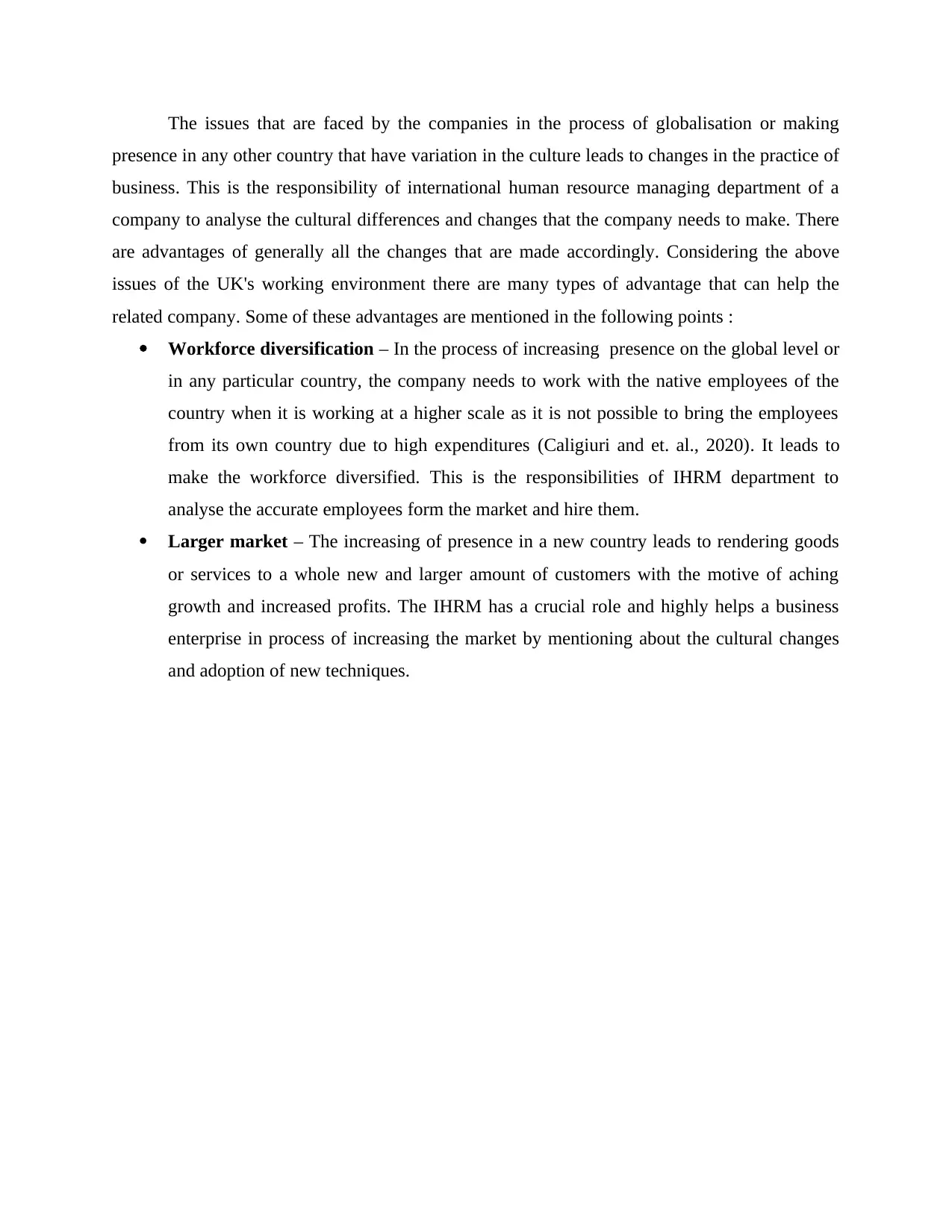
The issues that are faced by the companies in the process of globalisation or making
presence in any other country that have variation in the culture leads to changes in the practice of
business. This is the responsibility of international human resource managing department of a
company to analyse the cultural differences and changes that the company needs to make. There
are advantages of generally all the changes that are made accordingly. Considering the above
issues of the UK's working environment there are many types of advantage that can help the
related company. Some of these advantages are mentioned in the following points :
Workforce diversification – In the process of increasing presence on the global level or
in any particular country, the company needs to work with the native employees of the
country when it is working at a higher scale as it is not possible to bring the employees
from its own country due to high expenditures (Caligiuri and et. al., 2020). It leads to
make the workforce diversified. This is the responsibilities of IHRM department to
analyse the accurate employees form the market and hire them.
Larger market – The increasing of presence in a new country leads to rendering goods
or services to a whole new and larger amount of customers with the motive of aching
growth and increased profits. The IHRM has a crucial role and highly helps a business
enterprise in process of increasing the market by mentioning about the cultural changes
and adoption of new techniques.
presence in any other country that have variation in the culture leads to changes in the practice of
business. This is the responsibility of international human resource managing department of a
company to analyse the cultural differences and changes that the company needs to make. There
are advantages of generally all the changes that are made accordingly. Considering the above
issues of the UK's working environment there are many types of advantage that can help the
related company. Some of these advantages are mentioned in the following points :
Workforce diversification – In the process of increasing presence on the global level or
in any particular country, the company needs to work with the native employees of the
country when it is working at a higher scale as it is not possible to bring the employees
from its own country due to high expenditures (Caligiuri and et. al., 2020). It leads to
make the workforce diversified. This is the responsibilities of IHRM department to
analyse the accurate employees form the market and hire them.
Larger market – The increasing of presence in a new country leads to rendering goods
or services to a whole new and larger amount of customers with the motive of aching
growth and increased profits. The IHRM has a crucial role and highly helps a business
enterprise in process of increasing the market by mentioning about the cultural changes
and adoption of new techniques.
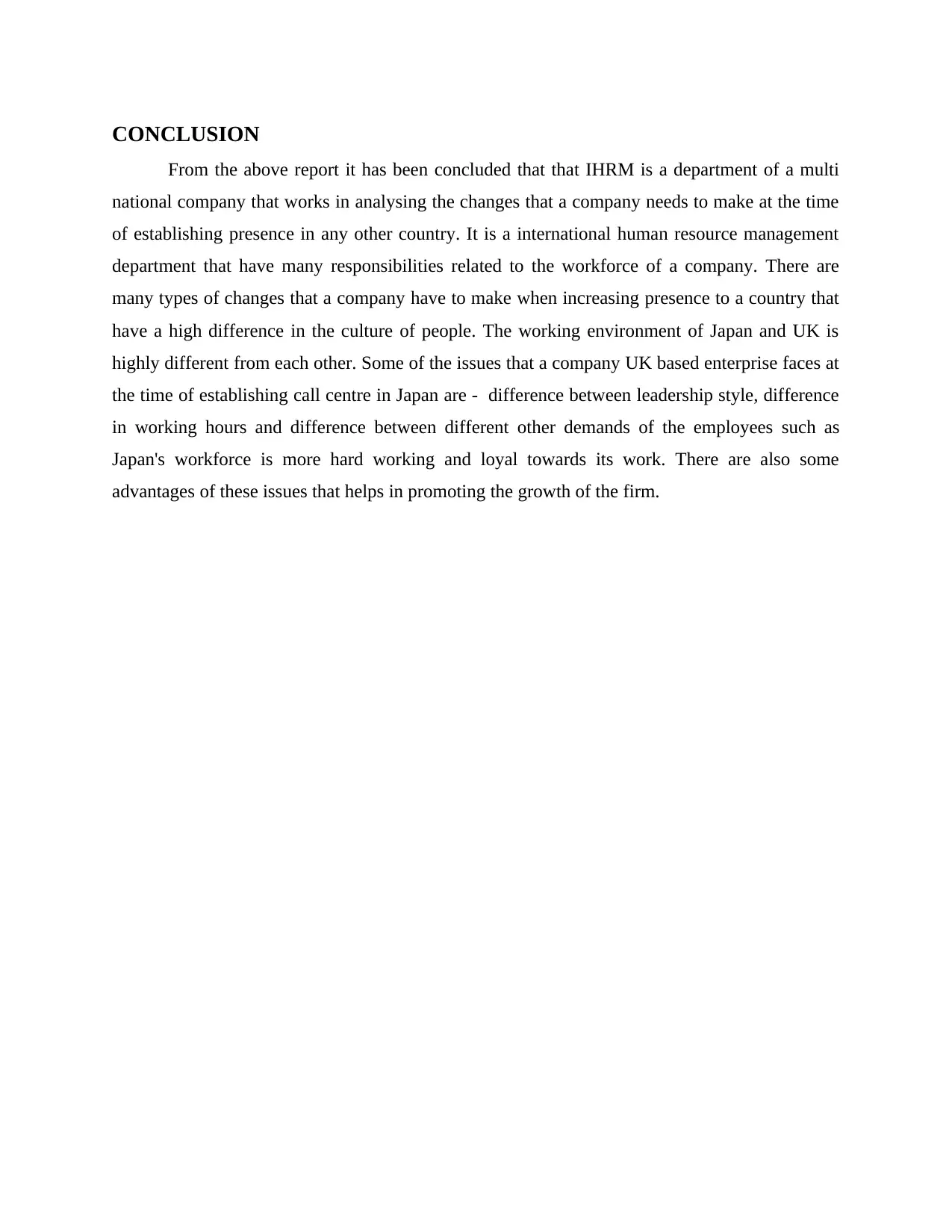
CONCLUSION
From the above report it has been concluded that that IHRM is a department of a multi
national company that works in analysing the changes that a company needs to make at the time
of establishing presence in any other country. It is a international human resource management
department that have many responsibilities related to the workforce of a company. There are
many types of changes that a company have to make when increasing presence to a country that
have a high difference in the culture of people. The working environment of Japan and UK is
highly different from each other. Some of the issues that a company UK based enterprise faces at
the time of establishing call centre in Japan are - difference between leadership style, difference
in working hours and difference between different other demands of the employees such as
Japan's workforce is more hard working and loyal towards its work. There are also some
advantages of these issues that helps in promoting the growth of the firm.
From the above report it has been concluded that that IHRM is a department of a multi
national company that works in analysing the changes that a company needs to make at the time
of establishing presence in any other country. It is a international human resource management
department that have many responsibilities related to the workforce of a company. There are
many types of changes that a company have to make when increasing presence to a country that
have a high difference in the culture of people. The working environment of Japan and UK is
highly different from each other. Some of the issues that a company UK based enterprise faces at
the time of establishing call centre in Japan are - difference between leadership style, difference
in working hours and difference between different other demands of the employees such as
Japan's workforce is more hard working and loyal towards its work. There are also some
advantages of these issues that helps in promoting the growth of the firm.
⊘ This is a preview!⊘
Do you want full access?
Subscribe today to unlock all pages.

Trusted by 1+ million students worldwide
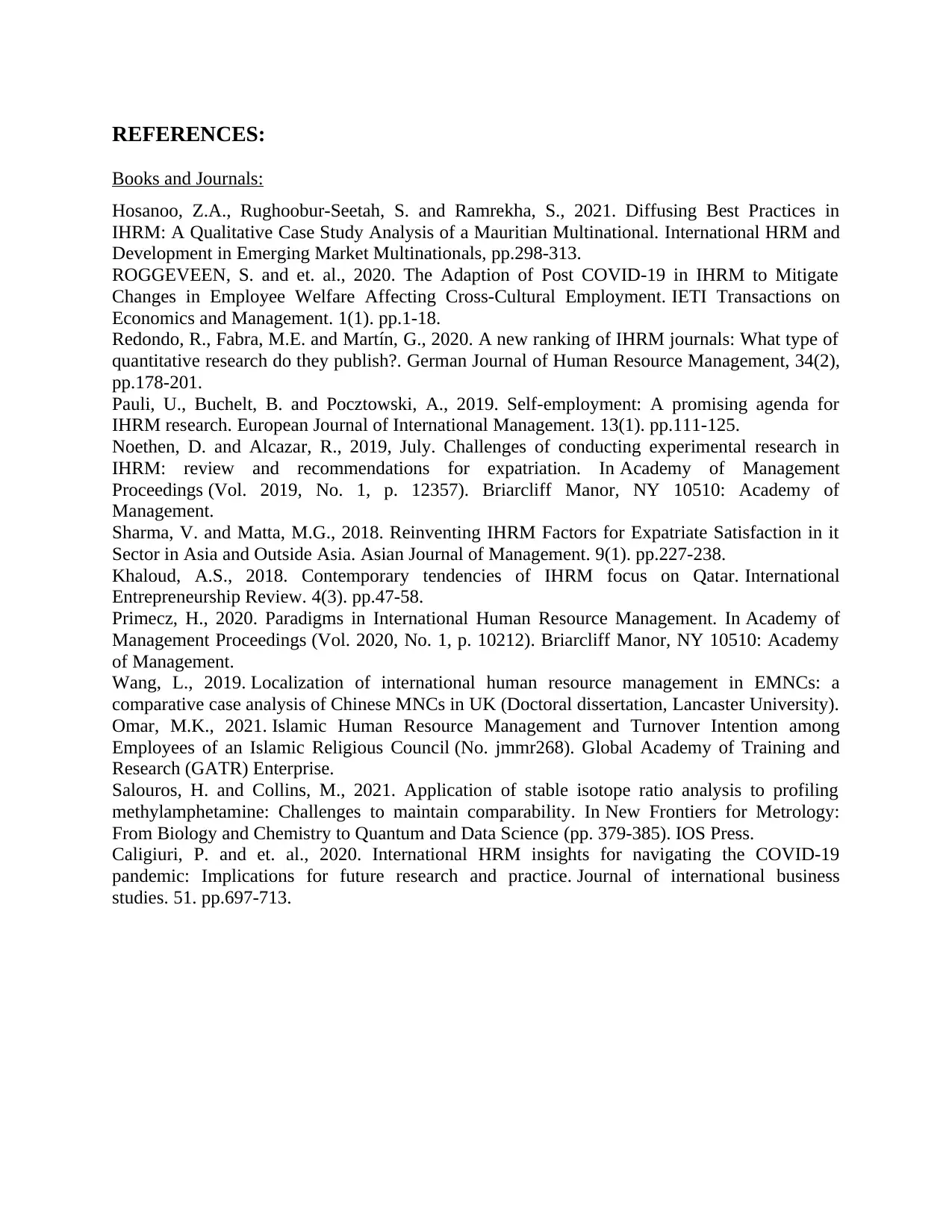
REFERENCES:
Books and Journals:
Hosanoo, Z.A., Rughoobur-Seetah, S. and Ramrekha, S., 2021. Diffusing Best Practices in
IHRM: A Qualitative Case Study Analysis of a Mauritian Multinational. International HRM and
Development in Emerging Market Multinationals, pp.298-313.
ROGGEVEEN, S. and et. al., 2020. The Adaption of Post COVID-19 in IHRM to Mitigate
Changes in Employee Welfare Affecting Cross-Cultural Employment. IETI Transactions on
Economics and Management. 1(1). pp.1-18.
Redondo, R., Fabra, M.E. and Martín, G., 2020. A new ranking of IHRM journals: What type of
quantitative research do they publish?. German Journal of Human Resource Management, 34(2),
pp.178-201.
Pauli, U., Buchelt, B. and Pocztowski, A., 2019. Self-employment: A promising agenda for
IHRM research. European Journal of International Management. 13(1). pp.111-125.
Noethen, D. and Alcazar, R., 2019, July. Challenges of conducting experimental research in
IHRM: review and recommendations for expatriation. In Academy of Management
Proceedings (Vol. 2019, No. 1, p. 12357). Briarcliff Manor, NY 10510: Academy of
Management.
Sharma, V. and Matta, M.G., 2018. Reinventing IHRM Factors for Expatriate Satisfaction in it
Sector in Asia and Outside Asia. Asian Journal of Management. 9(1). pp.227-238.
Khaloud, A.S., 2018. Contemporary tendencies of IHRM focus on Qatar. International
Entrepreneurship Review. 4(3). pp.47-58.
Primecz, H., 2020. Paradigms in International Human Resource Management. In Academy of
Management Proceedings (Vol. 2020, No. 1, p. 10212). Briarcliff Manor, NY 10510: Academy
of Management.
Wang, L., 2019. Localization of international human resource management in EMNCs: a
comparative case analysis of Chinese MNCs in UK (Doctoral dissertation, Lancaster University).
Omar, M.K., 2021. Islamic Human Resource Management and Turnover Intention among
Employees of an Islamic Religious Council (No. jmmr268). Global Academy of Training and
Research (GATR) Enterprise.
Salouros, H. and Collins, M., 2021. Application of stable isotope ratio analysis to profiling
methylamphetamine: Challenges to maintain comparability. In New Frontiers for Metrology:
From Biology and Chemistry to Quantum and Data Science (pp. 379-385). IOS Press.
Caligiuri, P. and et. al., 2020. International HRM insights for navigating the COVID-19
pandemic: Implications for future research and practice. Journal of international business
studies. 51. pp.697-713.
Books and Journals:
Hosanoo, Z.A., Rughoobur-Seetah, S. and Ramrekha, S., 2021. Diffusing Best Practices in
IHRM: A Qualitative Case Study Analysis of a Mauritian Multinational. International HRM and
Development in Emerging Market Multinationals, pp.298-313.
ROGGEVEEN, S. and et. al., 2020. The Adaption of Post COVID-19 in IHRM to Mitigate
Changes in Employee Welfare Affecting Cross-Cultural Employment. IETI Transactions on
Economics and Management. 1(1). pp.1-18.
Redondo, R., Fabra, M.E. and Martín, G., 2020. A new ranking of IHRM journals: What type of
quantitative research do they publish?. German Journal of Human Resource Management, 34(2),
pp.178-201.
Pauli, U., Buchelt, B. and Pocztowski, A., 2019. Self-employment: A promising agenda for
IHRM research. European Journal of International Management. 13(1). pp.111-125.
Noethen, D. and Alcazar, R., 2019, July. Challenges of conducting experimental research in
IHRM: review and recommendations for expatriation. In Academy of Management
Proceedings (Vol. 2019, No. 1, p. 12357). Briarcliff Manor, NY 10510: Academy of
Management.
Sharma, V. and Matta, M.G., 2018. Reinventing IHRM Factors for Expatriate Satisfaction in it
Sector in Asia and Outside Asia. Asian Journal of Management. 9(1). pp.227-238.
Khaloud, A.S., 2018. Contemporary tendencies of IHRM focus on Qatar. International
Entrepreneurship Review. 4(3). pp.47-58.
Primecz, H., 2020. Paradigms in International Human Resource Management. In Academy of
Management Proceedings (Vol. 2020, No. 1, p. 10212). Briarcliff Manor, NY 10510: Academy
of Management.
Wang, L., 2019. Localization of international human resource management in EMNCs: a
comparative case analysis of Chinese MNCs in UK (Doctoral dissertation, Lancaster University).
Omar, M.K., 2021. Islamic Human Resource Management and Turnover Intention among
Employees of an Islamic Religious Council (No. jmmr268). Global Academy of Training and
Research (GATR) Enterprise.
Salouros, H. and Collins, M., 2021. Application of stable isotope ratio analysis to profiling
methylamphetamine: Challenges to maintain comparability. In New Frontiers for Metrology:
From Biology and Chemistry to Quantum and Data Science (pp. 379-385). IOS Press.
Caligiuri, P. and et. al., 2020. International HRM insights for navigating the COVID-19
pandemic: Implications for future research and practice. Journal of international business
studies. 51. pp.697-713.
1 out of 10
Related Documents
Your All-in-One AI-Powered Toolkit for Academic Success.
+13062052269
info@desklib.com
Available 24*7 on WhatsApp / Email
![[object Object]](/_next/static/media/star-bottom.7253800d.svg)
Unlock your academic potential
Copyright © 2020–2026 A2Z Services. All Rights Reserved. Developed and managed by ZUCOL.





